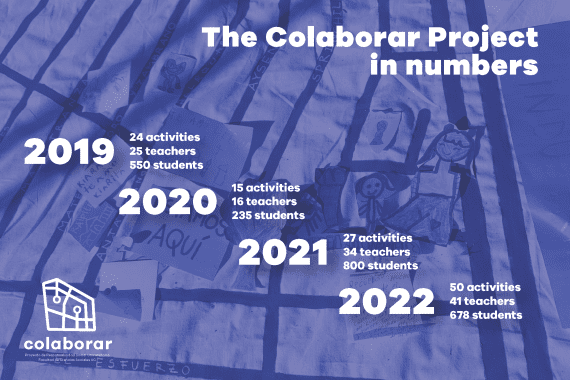Proyecto COLABORAR (Pontificia Universidad Católica de Chile)
Honorable Mention, 2023 MacJannet Prize
The COLABORAR project was born in 2018 out of the concern of students, academics, and staff from the Faculty of Social Sciences at UC (Pontifical Catholic University of Chile) to promote greater engagement with the local community. The Faculty recognizes itself as isolated from the geographical environment in which it is located, so it aims to develop a University Social Responsibility project in the troubled neighborhood of “La Legua”, located within the comune of San Joaquín (Santiago, Metropolitan Region of Chile), just 10 minutes away from the university campus. The project is aimed to become a long term initiative, focusing in creating strong university-community bonds.
The project has three main objectives:
- Strengthen the organizations and community of La Legua to prevent children and youth from becoming involved in violence.
- Link the comprehensive development and academic formation of social sciences students with the work of organizations in La Legua to achieve deep and meaningful learning.
- Promote research on socially relevant issues for La Legua from the perspective of social science disciplines.
COLABORAR was initiated under the leadership of then-Dean Eduardo Valenzuela and the Dean’s team, supported by faculty and student teams, as a response to the challenges faced by a neighboring territory marked by social exclusion, violence, drug trafficking, human rights violations, mental health crises, among other issues. Following a territorial diagnosis, it was identified that strengthening the community and fostering organizational development were the most pertinent and sustainable approaches to tackling these challenges in the area.
Furthermore, it is proposed that this project has an impact on the quality of education for students in the Faculty of Social Sciences. Through alliances with local organizations, the project aims to promote opportunities for meaningful and experiential learning (such as service-learning), where students can develop public commitment, critical thinking, ethical professional reflection, problem-solving skills, and collaborative work.
The project is led by the current Dean, Mariane Krause, and coordinated by the Dean’s team. The executive coordination brings together faculty members and undergraduate and graduate students, who work in alignment with the needs and challenges of the organizations in La Legua. This coordination is supported by an academic team comprising six representatives from different academic units within the Faculty.
“One of the criticisms that students often make is the lack of direct contact with the topics they study, as well as the difficulty of going from diagnoses to proposals that respond to a concrete reality. COLABORAR allows that direct knowledge of the reality that is lived in La Legua, where we observe and know a context that requires us to make what we study more complex, in terms, for example, of inequality, stigma, violence, and social and community organization.”
— Pilar Larroulet, academic at the UC Institute of Sociology.
“COLABORAR greatly encourages social commitment, a commitment that I translate into the affection that I feel and that is transmitted by the leaders, men and women leaders in the territory of La Legua.”
— Nicolás Becerra, UC Psychology student.
“I think this project gives students an opportunity to experience the vulnerabilities and inequalities of our country, making them aware of the social problems they will have to address in their future professional performance.”
— Felipe Martínez, academic at the UC School of Anthropology